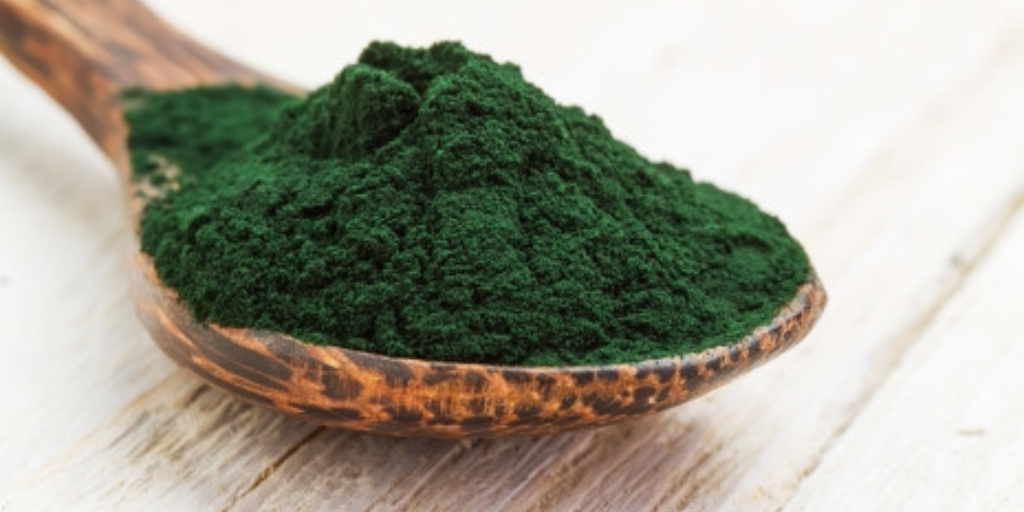Today I want to introduce you to Spirulina, a dark blue-green alga that grows in extremely alkaline water. What I love about this seaweed, in addition to the large amount of protein it provides, is that it has numerous other health benefits such as: anti-inflammatory action, improves immunity, reverses aging, promotes gut health, detoxifies the liver, improves acne, enhances physical performance, reduces allergies and much more.
Spirulina is called superfood because its nutritional profile is more potent than any other animal or plant food. Algae contain greater amounts of chlorophyll than any other plant. More than 60% of its caloric value comes from highly bioavailable and easily digestible proteins – in addition, it contains a higher content of beta-carotene and nucleic acids than any other food of animal or vegetable origin. It also contains more iron than meat and more calcium than milk, in the same proportion.
These nutrients and phytonutrients make spirulina a great food alternative to single vitamin supplements. Its large store of nucleic acids (DNA/RNA) is known to cause cell regeneration and reversal of aging. In addition, it contains high doses of omega 3 and gamma-linoleic acid GLA, also associated with aging delay and anti-inflammatory action.
It is generally nourishing, tonic, and indicated to reverse cases of deficiencies, while promoting a cleansing effect due to its high chlorophyll content. This is because its nutrients are quickly digested and absorbed, which provides quick energy soon after ingestion.
Therefore, it benefits those with problems caused by an excessively protein-based diet of animal origin, which is not well assimilated by the body and can cause the formation of excess toxins. By ingesting 10 grams of spirulina a day, the body becomes satisfied and the craving for animal protein diminishes.
Properties:
- Highly nutritious, rich in vitamins, minerals and antioxidants
- Detoxifies the liver and kidneys
- Purifies and strengthens the blood
- cleanse the arteries
- Improves intestinal flora
- Inhibits the growth of fungi and bacteria
- Strengthens the immune system
- Purifies the skin
- reverse aging
With so many good properties, let's check out the nutritional profile of spirulina:
Proteins | 60-70% of its caloric value is highly bioavailable protein, easy to digest. Every 100g can contain 65g of protein. To understand it better: 100g of chicken contains 16g of protein or an egg contains 13g of protein for every 100g.
Amino Acids | contains all essential amino acids => complete protein
Healthy Fats | mainly in the form of polyunsaturated fatty acids.
Omega-3 | linolenic acid, 0.8 g/100g
Omega-6 | linoleic acid, GLA 1.2 g / 100g
Vitamin B12 | Special note: the form of B12 found in spirulina is a pseudovitamin, therefore, it is not a reliable source of B12 for humans as it is an inactive form. It is considered an analogue, which does not have the same bioavailability as animal sources of B12.
Vitamins A, D, K, E
B complex vitamins | B1 (thiamine), B2 (riboflavin), B3 (niacin), folic acid, B5
antioxidants | carotenoids} beta-carotene, lutein, zeaxanthin, cryptoxanthin
Chlorophyll
Copper | 6/1 mg / 100g
iron | 28mg / 100g
Magnesium | 195mg / 100g
Potassium | 1.3 g / 100 g
Manganese | 1.9 mg / 100g
Zinc | 2mg/100g
By now, you're probably wondering how to introduce this rich algae into your life. As a powder, it can be mixed with water and lemon, plain water or coconut water, or mixed with green juice. I consume spirulina from Pure life in tablets, because it is certified organic, something that should be taken into account, as it is an algae that grows in water, and this facilitates the absorption of heavy metals present around where it grows. Currently there are already several brands on the market, which can be found in natural food stores or internet sites.
I take 5-10 tablets every morning on an empty stomach or after physical activity, but it can be taken at any time. Provides a great deal of energy to get through the day without relying on coffee or other stimulants like sugar.
Did you already know spirulina? If so, what is your preferred way of incorporating it into your diet? Share in the comments below, I'd love to hear it!
References
1- Vonshak, Avigad. LV Venkataraman. Spirulina platensis (Arthrospira): Physiology, Cell Biology and Biotechnologym. Journal of Applied Physiology. June 1997, Volume 9, Issue 3, pp 295-296
2- Pitchford, Paul. Asian traditions and modern nutrition: Healing with whole foods.


I loved knowing that!! I came across your blog today by chance looking for articles on apple cider vinegar, and I'm loving the information it's great and available with a clean, uncluttered look! My congratulations, you got a reader!
Wow, I loved knowing more about apple cider vinegar, the way you write really makes us interested in reading…Congratulations! 👏👏👏👏👏
Hi Tania! I'm extremely happy to hear that you liked the tips and were interested in learning more! Welcome! Gratitude!
Your post is very enlightening!! 😉
Hi. Spirulina also contains a blue antioxidant called phycocyanin. It corresponds to no less than 16% of your weight! It has been extensively researched for its action in the body. I'm a spirulina producer. If you want more information or even buy a little, stay here to get in touch Spirul@ymail.com or look at my website brasilvital.com.br/site/ I also use it in cosmetics. Thierry hugs
Congratulations, your health tips are great!